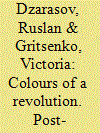| Srl | Item |
| 1 |
ID:
173436


|
|
|
|
|
| Summary/Abstract |
The Ukraine crisis is usually treated either as Russia’s return to the old-style empire-building (the right) or as a clash of two imperialisms (the left). However, the essence of this crisis can be understood only from the dual perspective of the consequences of the Stalinist degeneration of the Russian Revolution and the fate of the modern global capitalism. The most rotten sections of the Soviet bureaucracy moved the society to capitalism. However, this effort could secure only a peripheral (Ukraine) or at best semi-peripheral (Russia) position in the capitalist world-system as a provider of cheap raw materials. Meanwhile, modern capitalism led to world economic crisis. In these conditions, the capital of the core capitalist countries obviously decided to strengthen its control over the periphery, and Russia’s aspirations to secure its domination over the former Soviet space were in the way. To thwart them, Western powers decided to provoke a Ukraine crisis, exploiting Ukrainians’ justified indignation at the backwardness and corruption inherent in their own peripheral capitalism. Hence, a study of the properties of the post-Soviet societies and their place in the world hierarchy is the key to understanding the Ukraine crisis.
|
|
|
|
|
|
|
|
|
|
|
|
|
|
|
|
| 2 |
ID:
141800


|
|
|
|
|
| Summary/Abstract |
This study develops and tests two arguments for how repertoires of political action are reconfigured in post-communist Romania. Using multivariate statistical analysis, it examines whether citizens' engagement in post-communist politics is linked with generic socioeconomic and attitudinal traits or, alternatively, if it is connected with selective mobilisation opportunities provided by social networks and organisations. The findings reveal that while most Romanians are politically inactive two decades after the fall of communism, those who engage in politics do so selectively and their political action repertoires are largely influenced by four mobilising agents: trade unions; political parties; social networks; and civil society organisations.
|
|
|
|
|
|
|
|
|
|
|
|
|
|
|
|